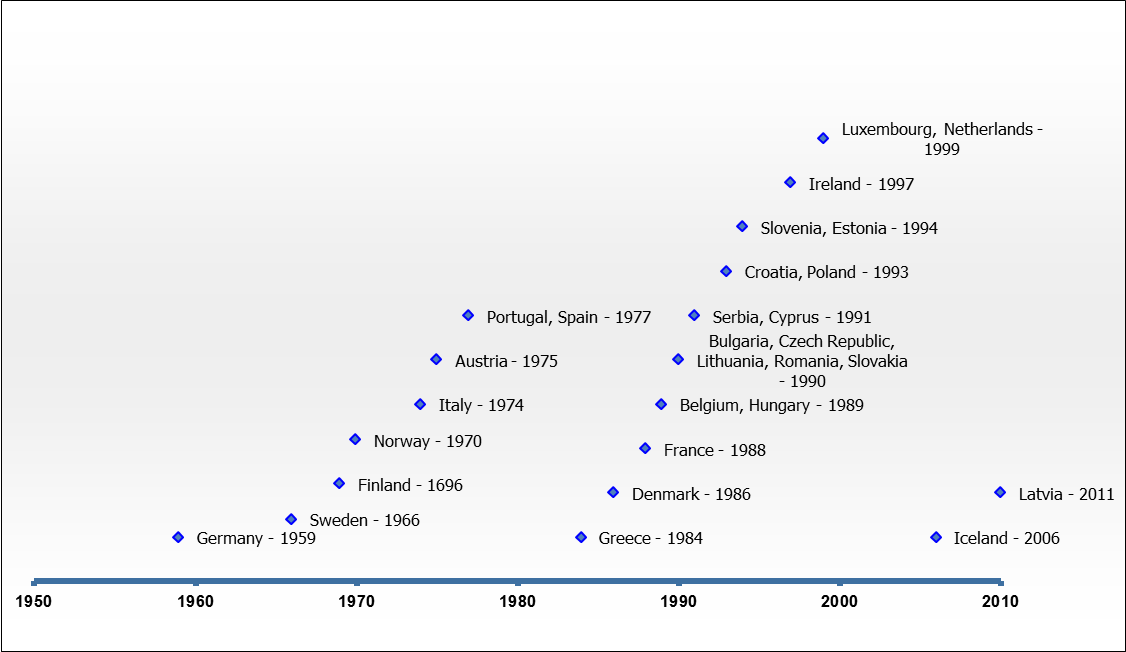Results
In this page we show some of the results of our research on the legal regulation of political parties in 33 European countries, including the cronology of party constitutionalization and of the adoption of party laws and party finance, descriptive statistics and matrixes on party party regulation by country.
Summary
• Party regulation in Europe: an overview
• Chronology of party constitutionalization
• Party laws in post-war Europe
• Public funding to party in central office: year of introduction
• State dependency of political parties in Europe
• Party regulation in Europe: an overview
 Party regulation has received growing consideration from the scholarly literature in recent years. The increasing attention towards this phenomenon reflects a trend of proliferation in European countries of rules affecting political parties in their internal organization, in their external activities, or in their financial management. We looked at party regulation in three fundamental sources of law: Constitutions, party laws and party finance laws. The table below provides a chronology of post-war regulation of political parties in national constitutions, party laws and party finance laws. [click here to link to paper]
Party regulation has received growing consideration from the scholarly literature in recent years. The increasing attention towards this phenomenon reflects a trend of proliferation in European countries of rules affecting political parties in their internal organization, in their external activities, or in their financial management. We looked at party regulation in three fundamental sources of law: Constitutions, party laws and party finance laws. The table below provides a chronology of post-war regulation of political parties in national constitutions, party laws and party finance laws. [click here to link to paper]
• Chronology of party constitutionalization
The relevance of political parties for modern democracy has become recognized increasingly in constitutional terms, underlining the relevance parties as indispensible institutional components of the democratic system. Whilst the constitutions of the established liberal democracies historically have typically refrained from mentioning political parties or prescribing their role in the political system, the period following World War Two has witnessed an ongoing process of party constitutionalization. The figure below represents the chronology of party constitutionalization in post-war Europe showing for each country the year in which political parties were first incorporated in the national constitution. [click here to link to paper]
• Party laws in post-war Europe
Political  parties have become increasingly subject to laws in the recent years. The liberal principle of non intervention in political parties' internal matters that prevailed across the European continent since the very emergence of political parties as organizations seems no longer to be the dominant paradigm. The figure presented shows the process of party regulation through party laws in Europe, starting with the establishment of the German Party Law in 1967. [click here to link to paper]
parties have become increasingly subject to laws in the recent years. The liberal principle of non intervention in political parties' internal matters that prevailed across the European continent since the very emergence of political parties as organizations seems no longer to be the dominant paradigm. The figure presented shows the process of party regulation through party laws in Europe, starting with the establishment of the German Party Law in 1967. [click here to link to paper]
This table displays the year in which European countries adopted their first party finance law.The adoption of political finance laws has played a very important role in the process of party regulation from the state. Not only did they introduced provisions on the direct funding to political parties but they also contributed to the establishment of further rules on political parties, demanding for a more codified system of party registration and control. [click here to link to paper]
• Public funding to party in central office: year of introduction
This figure refers to the year of introduction of public funding disbursed to political parties' extra-legislative work. It is worth recalling that while the trend towards the provision of direct public subsidies to political parties is uncontroversial, this form of payment is a relatively recent phenomenon, which took several decades to be adopted throughout Europe. While almost all established European democracies had introduced systems of public funding to political parties by the end of the 1980s (with the exception of Ireland, the Netherlands, Cyprus and Iceland), the younger European democracies in Southern and Eastern Europe introduced such systems at the same time they democratized, or soon thereafter. [click here to link to chapter]
• State dependency of political parties in Europe
This figure displays the financial dependence on the state for parties in the 23 countries for which GRECO evaluations have been completed thus far, providing both the lowest and highest values of their estimates. In all countries except Germany and The Netherlands, state subventions amount to at least half of the total party income, while in the majority of countries the state is responsible for two-thirds or more of party income. [click here to link to article]


.jpg)




